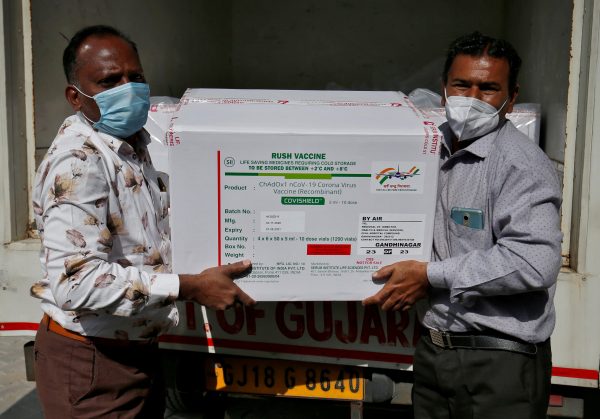The rapid surge of cases in this second wave of COVID-19 has quickly overwhelmed India’s health care system. Medical oxygen, a vital tool for treating patients whose blood oxygen levels are too low, is in such short supply that some hospitals are asking patients to bring their own oxygen with them. Hospitals have even sued the government to force it to devise a plan to supply oxygen. Patients who can’t get a hospital bed are being forced to lie outside because there is no space inside.
Compounding the situation is the sheer lack of vaccines to stop further spread of the virus. In late April, Mumbai, home to roughly 20 million people, had to stop all vaccination campaigns for three days because it had no more vaccines. Though India is the world’s biggest producer of vaccines and has been engaged in an active vaccine diplomacy program, the country is now importing doses of Russia’s Sputnik and the AstraZeneca vaccine, along with the locally-produced Covaxin vaccine, to resume its vaccination program The country was able to resume vaccinations thanks to donations of Russia’s Sputnik vaccine and locally-produced supplies of the AstraZeneca and Covaxin vaccines.
Despite widespread acknowledgement that viruses do not respect borders, India’s devastating experience with COVID-19 calls into question the degree to which the international community is willing to translate idea into practice. Programs like the COVID-19 Vaccine Global Access (COVAX) are supposed to ensure a more equitable distribution of COVID-19 vaccines, but the reality seems instead to reinforce the inequalities around vaccine distribution.
While shipments of the AstraZeneca vaccine from the United States will be helpful, there is more that it could do to ameliorate the shortages in India—and the inequitable access to COVID vaccines more generally. A program like COVAX or donations from the United States can only do so much to resolve structural inequalities that limit access to pharmaceuticals and vaccines; it addresses the immediate issues but not the underlying root causes that give rise to maldistribution in the first place. If world leaders want to make pharmaceuticals more accessible, they need to change the intellectual property rights system governing therapeutic drugs.
Intellectual property rights grant creators the right to control who gets to produce a product and under what conditions through the granting of patents. This control is supposed to reward innovation by allowing creators of intellectual property to reap the rewards from their discoveries.
This might make sense in the case of a car or a computer, but what happens when the people who need access to a drug to protect public health are the very people who lack the money to purchase it? When commerce takes precedence over public health and prevents people from getting the drugs that can protect their own lives and those of others, the risk increases for everyone.
This tension between commercial interests and health is not unique to COVID-19. When antiretrovirals were developed to prolong the lives of those living with HIV, the annual cost was more than US$10,000 — making them completely unaffordable for the majority of people in the countries with the highest rates of HIV infection. This led to the adoption of the Doha Declaration in 2001, allowing countries to ignore patent protections for pharmaceuticals when there is a public health emergency. This includes allowing countries to manufacture their own generic versions of patented drugs.
Both India and South Africa have called on the World Trade Organization (WTO) to declare a public health emergency. Wealthy states resisted these pleas for months, but the United States and China have both announced that they would support a waiver in this instance, though pharmaceutical manufacturers and a number of European governments remain opposed. Drug companies argue that the move would stifle the innovations that allowed them to develop the vaccines so quickly, and European governments argue that the move will do little to ease the shortage. Even with American and Chinese support, though, the WTO’s consensus-based decision-making process means that it is entirely unclear when (or if) a waiver will be granted — while India’s COVID-19 outbreak continues to explode.
Stopping the global COVID-19 pandemic requires meaningful international cooperation. The outbreak in India shows what happens when that collaboration is absent or slow in coming. Action is needed that requires a willingness to change the rules about pharmaceutical intellectual property rights to match the scope and scale of the challenge from the disease that the global community faces.
Jeremy Youde is Dean of the College of Liberal Arts at the University of Minnesota Duluth.
This article is part of an EAF special feature series on the COVID-19 crisis and its impact.

